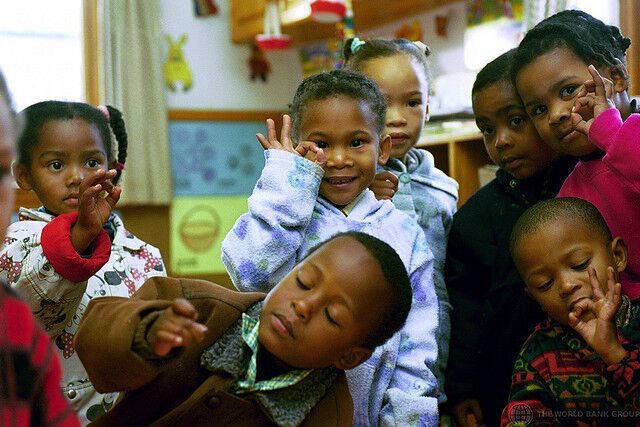Sandra Burman: children's rights
23 December 2015 | Story Natalie Simon. Photo World Bank.
Children’s rights are enshrined in South Africa’s constitution, and the country boasts progressive legislation, policies and programs that on paper serve to protect children. Yet the high levels of violence, sexual abuse, exploitation and neglect perpetrated against children in the country tell a different story.
The late Emeritus Professor Sandra Burman, former director of the Centre for Socio-Legal Research, dedicated much of her life’s work to bridging the divide between rights on paper and the systems charged with ensuring their implementation.
From the Centre for Socio-Legal research, Burman investigated how legal decisions on children are made in South Africa, and how children’s rights fare in a variety of settings across the country. Her work showed that a pervasive lack of training and expertise among officials is often the greatest obstacle to achieving legal outcomes that are in the best interests of the child.
“Decisions that radically affect children’s futures – whether custody decisions on divorce, fostering, children’s homes or adoption placements, or juvenile court decisions – have lifelong consequences,” wrote Burman and colleagues in the introduction to their edited book, The Fate of the Child. “But there is little hard evidence of what is influencing such decisions in practice, nor how decision-making for South African children can be improved.” They go on to note that most South African professionals involved in legal processes are not sufficiently geared towards enabling children to participate meaningfully when important decisions have to be made about their futures.
Burman’s work did not stay confined to the ivory tower, however. In the lead up to the publication of Fate of the Child, Burman and her team, together with Francois Botha, director of the Discrimination and Harassment Office, ran a series of weekend workshops for key decision-makers such as magistrates, family advocates and social workers to strengthen children’s rights in the legal system. Burman, who passed away after a long illness in January 2015, is widely acknowledged to have been a pioneer in the field of socio-legal studies in South Africa, something almost unknown in the 1990s and early 2000s.
“Dr Burman’s interdisciplinary training in law and social science provided the basis for an exceptional career as a researcher in this field,” says former dean of law Professor Dirk Van Zyl Smit. “Both internationally and nationally, she is widely regarded as one of the top researchers on socio-legal matters, especially those relating to law and the family.”
Burman’s other research interests included African customary law, compensation for illness and injury at work, the consequences of divorce and the history of illegitimacy in South Africa. All of her work fell under the umbrella of socio-legal studies.
In his tribute to Burman, professor of public law Hugh Corder described her as an “extraordinary intellectual pioneer”: “Despite huge obstacles, mainly emanating from the unusual nature of her work and a lack of funds and space,” he wrote, “dogged determination characterised all she did, against great odds.”
The late Emeritus Professor Sandra Burman, former director of the Centre for Socio-Legal Research, dedicated much of her life’s work to bridging the divide between rights on paper and the systems charged with ensuring their implementation.
From the Centre for Socio-Legal research, Burman investigated how legal decisions on children are made in South Africa, and how children’s rights fare in a variety of settings across the country. Her work showed that a pervasive lack of training and expertise among officials is often the greatest obstacle to achieving legal outcomes that are in the best interests of the child.
“Decisions that radically affect children’s futures – whether custody decisions on divorce, fostering, children’s homes or adoption placements, or juvenile court decisions – have lifelong consequences,” wrote Burman and colleagues in the introduction to their edited book, The Fate of the Child. “But there is little hard evidence of what is influencing such decisions in practice, nor how decision-making for South African children can be improved.” They go on to note that most South African professionals involved in legal processes are not sufficiently geared towards enabling children to participate meaningfully when important decisions have to be made about their futures.
Burman’s work did not stay confined to the ivory tower, however. In the lead up to the publication of Fate of the Child, Burman and her team, together with Francois Botha, director of the Discrimination and Harassment Office, ran a series of weekend workshops for key decision-makers such as magistrates, family advocates and social workers to strengthen children’s rights in the legal system. Burman, who passed away after a long illness in January 2015, is widely acknowledged to have been a pioneer in the field of socio-legal studies in South Africa, something almost unknown in the 1990s and early 2000s.
“Dr Burman’s interdisciplinary training in law and social science provided the basis for an exceptional career as a researcher in this field,” says former dean of law Professor Dirk Van Zyl Smit. “Both internationally and nationally, she is widely regarded as one of the top researchers on socio-legal matters, especially those relating to law and the family.”
Burman’s other research interests included African customary law, compensation for illness and injury at work, the consequences of divorce and the history of illegitimacy in South Africa. All of her work fell under the umbrella of socio-legal studies.
In his tribute to Burman, professor of public law Hugh Corder described her as an “extraordinary intellectual pioneer”: “Despite huge obstacles, mainly emanating from the unusual nature of her work and a lack of funds and space,” he wrote, “dogged determination characterised all she did, against great odds.”
 This work is licensed under a Creative Commons Attribution-NoDerivatives 4.0 International License.
This work is licensed under a Creative Commons Attribution-NoDerivatives 4.0 International License.
Please view the republishing articles page for more information.









